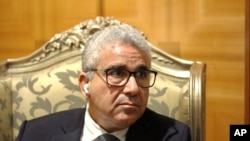As Libya's parliament, which meets in the eastern city of Tobruk, prepares to approve a new national unity government next week, the country's High Council of State says that the parliament should have consulted it before removing outgoing Prime Minister Abdul Hamid Dbeibeh. Dbeibeh is refusing to step down and it is not clear how the situation will evolve.
To say that Libya’s political situation is confused would be an understatement.
Both outgoing Prime Minister Abdul Hamid Dbeibeh and former interior minister Fathi Bashaga, the man named by parliament to replace him, enjoy significant support among militia forces, which control large chunks of western Libya. Both men are also from the western port city of Misrata, where divided loyalties make it even more unclear which man will prevail.
Khaled al Meshry, who heads the country's Tripoli-based High Council of State, is contesting the legitimacy of the new government. However, parliament — based in the eastern city of Tobruk — insists that outgoing Prime Minister Dbeibeh's mandate ran out on Dec. 24 and that the popularly elected body, whose mandate also ran out, has the authority to name a successor.
Fathi Milamy, an advisor to Libyan Parliament Speaker Aguilah Saleh, insists that the new government under Bashaga will govern no matter what anyone says, because parliament has the authority to appoint him.
He says the new government becomes official as soon as parliament gives it a vote of confidence. Even if Dbeibeh doesn't vacate his current offices, he says, there are other offices for Bashaga to use, elsewhere. Parliament has made its decision, he adds, and the new government will take over once approved.
Mohammed Hamouda, spokesman for outgoing Prime Minister Dbeibeh and his government, however, insists that the move to appoint a new government was not made by parliament in consultation with the High Council of State and is therefore not legal.
He says that it is the responsibility of the High Council of State to appoint a new prime minister and parliament must approve his new government. Moves made by parliament, he argues, were made unilaterally, without consulting the council of state.
Libya security analyst Aya Burweila tells VOA that opposition to the new government appears to be limited, with the exception of two Islamist militias led by Sadiq Gharyani and Salah Badi.
She adds that Bashaga "must offer a plan to integrate all militias into the existing national army," and "begin trust-building measures" given the difficulties of the task.
At the moment, the situation in most of Libya remains calm and none of the militia forces on the ground appears to have reacted very strongly to the appointment of a new prime minister. That, however, could change, once parliament gives a vote of confidence to Fathi Bashaga's new government and he is given the actual task of governing.







